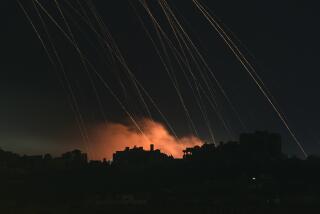Some Anti-Semitism Taken Out of Passion Play
- Share via
NEW YORK — Jewish high priests will no longer have horns, Judas will be a confused rather than a coldly mercenary figure and the temple merchants will no longer be among Jesus’ persecutors in the 1990 Oberammergau Passion Play.
But the half-million people who descend on the small German town in the Bavarian Alps for the account of Jesus’ final days will still hear the passage from Matthew that has plagued Jews for 19 centuries: “His blood be on us and our children.”
American Jewish leaders who have been meeting with village officials since 1985 to eliminate what they consider anti-Semitic images from the play applauded the changes but said they do not go far enough.
“The retention of the ‘blood curse’ is very problematic,” said Rabbi James Rudin, director of interreligious affairs for the American Jewish Committee in New York. “My dream was, my hope was, there would be a new play.”
But one of the play’s directors said the revisions, plus three votes and long discussions within the village about whether to keep the passage from Matthew 27:25 show that Oberammergau is sensitive to Jewish concerns.
“With all the changes, I think that anti-Semitism is not the problem of the play in 1990,” Otto Huber said in a telephone interview this week from his home in Oberammergau.
The Passion Play dates to 1663, when bubonic plague ravaged the mountain valley where Oberammergau sits. When the Roman Catholic villagers vowed to stage a passion play every 10 years if the plague abated, the epidemic vanished in what was considered a miracle, according to historical accounts.
The play was last performed in 1984, when a special jubilee production attracted 470,000 spectators. Americans accounted for about 45% of the visitors to the daylong production.
Since then, leaders of the American Jewish Committee and the Anti-Defamation League of B’nai B’rith have sought to change aspects of the play they believed maligned Jews and blamed them for the Crucifixion.
The idea that Jewish people have collective guilt for Jesus’ death has been devastating in its impact on Jews throughout the centuries, Rudin said.
The play will be performed this year from May 21 to Sept. 28.
Among the changes:
- Jesus’ identity as a Jew is emphasized, including having him and his followers wear traditional prayer shawls. “We have tried to show Jesus really as a Jew coming out from Jewish tradition and Jewish faith,” Huber said.
- Jesus has a larger popular following among Jews, and there is no longer a separation of Jesus and his followers and the rest of the Jewish community in light and dark clothing. “You had the good guys and the bad guys in the 1984 text,” Rudin said.
- There is no longer any connection between the temple merchants and Jesus’ persecutors. Rudin said that connection was “one of the worst stereotypes of the play,” playing on anti-Semitic images such as “Shylock.”
- The Jewish high priests who presided at the trial that led to the condemnation of Jesus will no longer have horns, an image carried over from the Middle Ages.
- Pontius Pilate, who prior to 1984 was portrayed a noble Roman and in 1984 was shown as ambivalent in sentencing Jesus to death, is presented in the 1990 text as an unsympathetic, brutal character.
- Judas Iscariot, the disciple who betrayed Jesus, is portrayed as a confused character who lost faith in Jesus, rather than as a man motivated only by the 30 pieces of silver he received for giving up Jesus.
Huber said the changes show that Oberammergau is “very conscious about all the questions of anti-Semitism.”
He noted that the passage from Matthew was barely approved by a 11-9 vote of the text committee, and only with the provision that a five-page explanation saying it does not apply to one race and outlining the history of anti-Semitism surrounding it be included in scripts that tourists purchase to follow the German-language play.
While it may be difficult to find someone to write a new play, Huber said, he favors continuing discussions for the production in 2000.
More to Read
The biggest entertainment stories
Get our big stories about Hollywood, film, television, music, arts, culture and more right in your inbox as soon as they publish.
You may occasionally receive promotional content from the Los Angeles Times.










